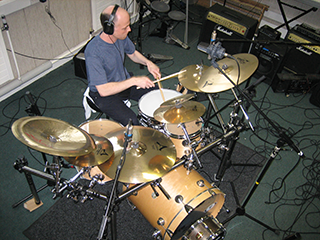

Learning to play music not the drums is the most basic cornerstone of any teacher´s curriculum. All rhythms, grooves and exercises must be linked to the relevant type of music to have any value to the student. The different styles of music which we encounter in our musical journey present the same technical/philosophical challenges whether we are playing jazz, rock or Afro Cuban.
What we practice and how we practice are far more important than the length of time spent in practicing. A concentrated hours worth of hard concentration is far better than two hours of unproductive messing about. Remember also that the way in which we practice is the way we will play. Time spent investigating song form and structure will aid the student to "play the right thing at the right time"! Music is not a collection of "licks" but rather a complete understanding of the sound, culture and style of a particular song form.
By listening and responding to musical form and the other musicians, the student will play as a musician not a drummer. Certainly this is what other musicians look for. Strive for tone and touch in your playing. The most basic approach normally yields the best results as it fits with the other musicians and allows them to build a solid sense of melody and space. "Just because you can play something doesn´t mean that you should."
The ability to listen when you practice is also vital. This can be very painful initially but is invaluable. Investigate what you are playing and why you are playing it not what you think you are playing. The answers to these questions should be that it fits/enhances/is stylistically correct not that it is the latest lick you have perfected. Always record and listen to your practice as it will guide your next step in the musical journey as it determines what requires the most improvement at any given time.
